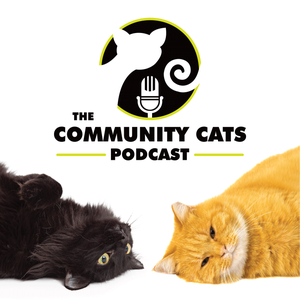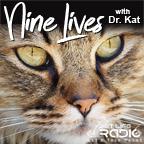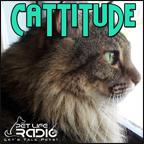
The Community Cats Podcast
The Community Cats Podcast
Together, we can help community cats all around the world!
- 57 minutes 38 secondsColony Caretaking Tips & Tricks, Part 1, featuring Bryan Kortis, National Programs Director of Neighborhood Cats"Community cats are creatures of habit. By feeding them on a routine schedule, you're not just meeting their needs—you’re building trust and making caretaking easier for everyone."
This episode is sponsored-in-part by Maddie’s Fund.
Welcome to part one of our two-part series on colony caretaking, where we uncover the secrets to thriving community cat colonies! Join Susan Richmond and Bryan Kortis from Neighborhood Cats as they share game-changing strategies to create strong bonds with community cats through feeding routines. Learn how to select nutritious food without breaking the bank, set up feeding stations that keep wildlife at bay, and take control of colony monitoring. This episode is packed with practical tips, heartwarming stories, and expert advice to make caretaking smoother and more impactful. Don’t miss this must-listen guide for every community cat advocate and caretaker!
Press Play Now For:
- Why routine is key to forming bonds with community cats.
- The do’s and don’ts of feeding schedules.
- Selecting the right food for health and budget.
- The importance of clean and discreet feeding setups.
- Managing wildlife and other challenges during feeding times.
Resources Mentioned:
- Neighborhood Cats Website: https://www.neighborhoodcats.org/
- Neighborhood Cats Facebook: https://www.facebook.com/neighborhoodcats/
- Neighborhood Cats Instagram: https://www.instagram.com/nbrhoodcats/
- The Everything TNR Playlist: https://communitycatspodcast.com/everythingtnr
- Feralvilla, Home of the World’s Best-Selling Outdoor Cat Shelter: https://feralvilla-com.3dcartstores.com/
- Online Cat Conference: https://www.communitycatspodcast.com/events/online-cat-conference-jan-2025/
- TNR Certification Workshop: https://www.communitycatspodcast.com/community-cat-care-training-education/
Follow & Review:
We’d love for you to follow us if you haven’t yet. Click that purple '+' in the top right corner of your Apple Podcasts app. We’d love it even more if you could drop a review or 5-star rating over on Apple Podcasts(https://podcasts.apple.com/us/podcast/the-community-cats-podcast/id1125752101?mt=2). Select “Ratings and Reviews” and “Write a Review” then a quick line with your favorite part of the episode. It only takes a second and it helps spread the word about the podcast.
7 January 2025, 9:00 am - 44 minutes 8 secondsStrategic Planning for Community Cats and Their Caregivers in 2025, Featuring Stacy LeBaron, Founder & Host of The Community Cats Podcast, with Mike Phillips, of Urban Cat League"My job is to figure out ways to get cats fixed. It's about strategy, collaboration, and making humane care accessible to every community."
This episode is sponsored-in-part by Maddie’s Fund.
In this reflective and forward-thinking episode of the Community Cats Podcast, host Stacy LeBaron takes center stage, offering listeners an intimate look at her mission and the exciting plans for 2025. Joined by Mike Phillips of Urban Cat League, Stacy discusses her journey of nearly three decades in animal welfare and the evolving goals of the podcast. With the motto "See it, Fix it, Solve it" at its core, Stacy outlines the strategic initiatives aimed at achieving humane solutions for community cats.
Listeners will gain insight into key topics, including the United Spay Alliance's efforts to bolster spay/neuter programs, the role of collaboration with social services, and the challenges of succession planning in rescue organizations. This episode is packed with innovative ideas, from the importance of accessible veterinary training (hello, wet labs!) to the transformative potential of tools like the Community Cat Calculator. Whether you’re a seasoned TNR practitioner or a new advocate for feline welfare, Stacy’s passion and strategic perspective will leave you inspired to take action in your own community.
Press Play Now For:
- The 2025 vision for community cat care: strategy and sustainability.
- Behind the scenes at the United Spay Alliance and its groundbreaking programs.
- The role of social service organizations in supporting community cats.
- Succession planning tips for rescue organizations and fostering the next generation of advocates.
- Tools like the Community Cat Calculator to assess and address feline population needs.
- How post-pandemic innovations are shaping the future of adoptions and clinic operations.
Resources Mentioned:
- United Spay Alliance
- Community Cat Calculator Tool
- National Kitten Coalition
- Community Cat Workshops
- University of the Pacific - Community Cat Program Management Course
Follow & Review:
We’d love for you to follow us if you haven’t yet. Click that purple '+' in the top right corner of your Apple Podcasts app. We’d love it even more if you could drop a review or 5-star rating over on Apple Podcasts. Select “Ratings and Reviews” and “Write a Review” then a quick line with your favorite part of the episode. It only takes a second and it helps spread the word about the podcast.
31 December 2024, 9:00 am - 33 minutes 34 secondsFrom Dairy Farms to DIY: A Look Back at 2024 and a Sneak Peek into 2025 with Kristen Petrie, Technical Tabby at The Community Cats Podcast"Pick that project you've been dreaming of and dive in—you'll be amazed by what you can accomplish for your community's cats!"
This episode is sponsored-in-part by Maddie’s Fund.
This week, we're pulling back the curtain on the Community Cats Podcast with Kristen Petrie, our behind-the-scenes "Technical Tabby." Join host Stacy LeBaron as they dive into the highlights of a year filled with innovative ideas, cross-country adventures, and practical solutions for cat advocacy. From groundbreaking training sessions in Pennsylvania to a remarkable barn cat rescue in Vermont, Kristen and Stacy share the stories, challenges, and triumphs that shaped 2024.
But that’s just the beginning—2025 is shaping up to be the year of doing it yourself! With new tools like the Community Cat Calculator and expanded educational programs, this episode offers a glimpse into how you can take charge of spay/neuter access and TNR efforts in your community. Whether you're learning from inspiring pioneers like Dr. Becky Morrow or wrangling 27 cats in a dairy barn, this conversation proves that bold ideas and teamwork can create real change.
Tune in for an honest, inspiring, and slightly cheese-fueled (Vermont style!) look at how cat lovers like you turn passion into progress.
Press Play Now For:
- Highlights from 2024, including top conferences and hands-on TNR projects.
- Lessons learned from Frankie's Friends and its innovative approach to high-volume spay/neuter.
- How to plan and execute large-scale TNR operations like the Vermont barn project.
- The launch of the Community Cat Calculator—your new tool for targeted spay/neuter goals.
- Education opportunities like the Community Cat Program Management class at the University of the Pacific.
- 2025’s “DIY” theme and tips for taking action in your community.
Resources Mentioned:
24 December 2024, 9:00 am - 32 minutes 44 secondsPiecing Together the Cat Overpopulation Puzzle, with Vicky Halls, Head of Unowned Cats, International Cat Care“Trap-neuter-return is one piece of the puzzle. When it’s part of a strategic cat population management program, TNR becomes a powerful tool for addressing feline overpopulation.”
This episode is sponsored-in-part by Maddie’s Fund.
How do we piece together the puzzle of cat overpopulation? In this episode of the Community Cats Podcast, Stacy LeBaron chats with Vicky Halls, Head of Unowned Cats at International Cat Care, about innovative strategies to address this global challenge. Drawing on decades of experience in feline welfare, Vicky introduces her "jigsaw puzzle" approach to managing cat populations, highlighting the importance of collaboration, root-cause solutions, and strategic trap-neuter-return (TNR) programs.
Learn how to connect the pieces for effective cat population management, navigate the challenges of global resource disparities, and explore the progressive work of the Battersea Cat Project. Whether you’re a TNR pro or new to community cat care, this episode offers actionable insights and inspiration.
Press Play Now For:
- The emotional and professional journey of a feline welfare trailblazer.
- Understanding root causes vs. symptoms in cat overpopulation.
- Insights into the "jigsaw puzzle" of cat population management.
- Strategies for effective TNR programs and community collaboration.
- An overview of the Battersea Cat Project's global impact.
- How access to resources shapes outcomes in cat population management.
Resources Mentioned:
- International Cat Care
- Email Vicky Halls at [email protected] for insights and collaboration.
- Video: Completing the jigsaw puzzle of sustainable and effective cat population management
Follow & Review:
We’d love for you to follow us if you haven’t yet. Click that purple '+' in the top right corner of your Apple Podcasts app. We’d love it even more if you could drop a review or 5-star rating over on Apple Podcasts. Select “Ratings and Reviews” and “Write a Review” then a quick line with your favorite part of the episode. It only takes a second and it helps spread the word about the podcast.
17 December 2024, 9:00 am - 35 minutes 43 secondsHow Trap-Neuter-Vaccinate-Return Programs Protect Cats and Communities: With Dr. Bob Weedon, HQHVSN & Community Cat Surgeon at Paws Plus Veterinary“By creating this barrier to rabies between wildlife, pets, and people, it’s not just about the well-being of the cats—it’s about the well-being of the community.”
This episode is sponsored-in-part by Maddie’s Fund, The Community Cat Clinic, and the Whisker Tracker App.
In this episode of the Community Cats Podcast, host Stacy LeBaron sits down with Dr. Bob Weedon, an expert in veterinary public health and a leading advocate for Trap-Neuter-Vaccinate-Return (TNVR) programs. Dr. Weedon shares insights into how TNVR programs are essential for managing cat populations and offer critical public health benefits. By vaccinating community cats, TNVR efforts create a vital “barrier” against diseases like rabies, protecting pets and humans. Dr. Weedon explains how public health officials can embrace TNVR as a community health strategy, emphasizing the power of collaboration between local governments, public health departments, and animal advocates.
The conversation ventures into the science behind rabies immunity, debunking misconceptions about cat-related diseases like toxoplasmosis, and why cat advocates should focus on reducing misinformation. Dr. Weedon also gives a sneak peek into potential breakthroughs in non-surgical sterilization techniques, which could revolutionize community cat management. Whether you're a cat advocate, public health professional, or just interested in animal welfare, this episode sheds light on the multi-layered impact of TNVR programs on communities nationwide.
Press Play Now For:
- The importance of vaccinating community cats to safeguard public health
- How TNVR programs help reduce rabies risks in local communities
- Strategies for presenting TNVR programs to town officials and addressing misconceptions
- Myths about toxoplasmosis and its connection to outdoor cats
- The potential future of non-surgical sterilization in community cat management
- Real-world examples of successful public-private partnerships in animal control
Resources Mentioned:
- Cat Wars: The Devastating Consequences of a Cuddly Killer by Peter P. Marra and Chris Santella (2016)
- Response of Feral Cats to Vaccination at the Time of Neutering by S.M. Fischer et al. (2007)
- Compendium of Animal Rabies Prevention and Control, 2016.
- Handbook of Zoonoses: Identification and Prevention by Colville and Berryhill (2007). This handbook provides detailed information on zoonotic diseases, including identification and preventive measures.
- Alliance for Contraception in Cats and Dogs (ACC&D)
- United Spay Alliance
Follow & Review:
We’d love for you to follow us if you haven’t yet. Click that purple '+' in the top right corner of your Apple Podcasts app. We’d love it even more if you could drop a review or 5-star rating over on Apple Podcasts. Select “Ratings and Reviews” and “Write a Review” then a quick line with your favorite part of the episode. It only takes a second and it helps spread the word about the podcast.
10 December 2024, 9:00 am - 31 minutes 58 secondsHow Meals on Wheels is Keeping People and Their Pets Together with Morgan Hultquist, Senior Manager of Strategy & Impact, Meals on Wheels, and Dan Capone, Executive Director, Meals on Wheels South Texas“97 percent of Meals on Wheels clients say that this type of programming does help them keep their pets. So it is really impactful and we’re so grateful for that.”
This episode is sponsored-in-part by Maddie’s Fund and the Whisker Tracker App.
In this episode, Stacy LeBaron dives into the inspiring intersection of pet welfare and human services with Morgan Hulquist of Meals on Wheels America and Dan Capone of Meals on Wheels South Texas. They discuss the groundbreaking Meals on Wheels Loves Pets program, which provides pet food, veterinary care, and emergency boarding for the pets of homebound seniors. With this unique approach, Meals on Wheels is helping clients maintain cherished bonds with their animals, often their primary source of comfort and companionship.
Morgan and Dan highlight the program’s nationwide growth, supported by partnerships like PetSmart Charities, and share stories that reveal the profound impact these services have on clients’ lives. From local pet food deliveries to connecting seniors with animal welfare resources, Meals on Wheels is tackling both logistical challenges and emotional needs to keep pets and people together. Listeners will learn how this program supports social connection and alleviates financial pressures, enabling seniors to keep their beloved pets close despite challenges. Discover the powerful role pets play in reducing isolation and learn how communities can rally together to expand this compassionate model.
Tune in to explore how Meals on Wheels is innovating to serve not just meals, but also love, care, and peace of mind for seniors and their four-legged family members.
Press Play Now For:
- The Power of Pets: How Meals on Wheels serves seniors and their beloved companions
- Keeping Pets at Home: Meals on Wheels Loves Pets program and its impact
- New Frontiers in Pet Care: From emergency boarding to veterinary partnerships
- Meeting Unique Needs: Finding solutions for pet food delivery challenges
- A Compassionate Approach: Building trust with pet-owning clients
- National Reach, Local Touch: Expanding pet programs through community partnerships
- Future Aspirations: Morgan's vision for a fully pet-inclusive Meals on Wheels
Resources Mentioned:
3 December 2024, 9:00 am - 25 minutes 13 secondsTrap, Neuter, Write? Unraveling the Mystery of TNVR with Sharon Marchisello, Board Member, Fayette Humane Society“Trap-Neuter-Return isn’t just a method; it’s a mission to bring community, compassion, and a little mystery into the world of cats.”
This episode is sponsored-in-part by Maddie’s Fund and the Whisker Tracker App.
In this episode of the Community Cats Podcast, host Stacy LeBaron speaks with animal advocate and mystery author Sharon Marchisello. Sharon’s lifelong passion for cats began early, sparking a journey that would lead her to volunteer work, board membership at the Fayette Humane Society in Fayetteville, GA, and, ultimately, authorship of a new cozy mystery, Trap, Neuter, Die. The novel is a blend of suspense and education, spotlighting Trap-Neuter-Vaccinate-Return (TNVR) practices within a storyline set in the world of animal rescue. Sharon delves into the real-life challenges and triumphs of TNVR efforts in Georgia, where unique cultural and legal landscapes impact community cat populations.
Sharon shares firsthand insights on the highs and lows of fostering, local partnerships that facilitate adoptions, and the ongoing quest to change outdated ordinances hindering effective cat management. As a volunteer grant writer, she also provides invaluable advice on securing funding for spay/neuter programs, underscoring the importance of clear objectives, precise tracking, and fitting grants to organization capabilities. Listen in to learn more about Sharon’s story and get inspired to make a difference for community cats.
Press Play Now For:
- Sharon’s journey from cat foster to board member at Fayette Humane Society
- Challenges of managing TNVR in Georgia, including year-round kitten seasons and cultural resistance
- Behind-the-scenes inspiration for Trap, Neuter, Die, a mystery that brings TNVR to a broader audience
- Practical tips for successful grant writing in animal rescue organizations
- The legal nuances of TNVR and how local ordinances can both help and hinder efforts
- Insights into partnerships with Northern rescues to support Southern community cats
Resources Mentioned:
- Sharon Marchisello’s Website
- Trap, Neuter, Die by Sharon Marchisello on Amazon
- Community Cat Clinic (Woodstock & Duluth, GA)
- Blog post: "How to Track Those Pesky Grants"
- Strategies for Reducing Cat Populations on YouTube
26 November 2024, 9:00 am - 34 minutes 3 secondsBuilding a Safe Haven for Working Cats with Mary Scott, Director of the Working Cats Program, ASAP Cats"Working cat programs historically have been programs of last resort... I like to think of the working cats program as really going beyond that, where every cat has the possibility of a live outcome…”
This episode is sponsored-in-part by Maddie’s Fund, The Community Cat Clinic, and the Whisker Tracker App.
In this episode filled with insight and inspiration, Stacy LeBaron, host of The Community Cats Podcast, sits down with Mary Scott, a dedicated animal advocate with over 15 years in the field of animal welfare. Mary’s journey, which started as a veterinary receptionist and shelter volunteer, led her to become the director of the ASAP Cat Shelter's Working Cats Program in Santa Barbara, California. This unique initiative offers non-social, feral, or semi-social cats a second chance by placing them as "working cats" on farms, nurseries, and other properties where they can thrive while providing natural pest control.
Throughout the episode, Mary shares her strategies for acclimating cats to new environments and ensuring they feel at home through careful preparation and adopter education. Stacy and Mary discuss the challenges and successes of maintaining a 95% live release rate, the importance of cultural education around spay and neuter, and the broader impact that working cats programs can have on communities. Whether you're looking to start a similar initiative or simply curious about humane ways to support non-social cats, this episode is packed with encouragement and practical advice for every animal advocate.
Press Play Now For:
- The evolution of Mary's career from teacher to animal welfare leader
- Insights into ASAP's Working Cats Program and its impact on non-social cats
- Proven methods to help cats acclimate safely to new environments
- The vital role of community support in humane cat management
- How microchip-enabled cat doors improve cat safety and security
- Mary's advice for starting a barn cat program in any community
- The importance of self-care for long-term success in animal welfare work
Resources Mentioned:
- ASAP Cats Website: asapcats.org
- Working Cats Program Application: Available under the Services section on the ASAP Cats website
- Contact Mary Scott at [email protected] or call 805-637-796
19 November 2024, 9:00 am - 50 minutes 36 secondsSaving Lives with Return-to-Field: The Future of Humane Cat Management, Part 2, with Bryan Kortis, National Programs Director, Neighborhood Cats"It's important to understand that nothing else works. There's no other method available if you want to control the cat population besides sterilization.”
This episode is sponsored-in-part by Maddie’s Fund and the Whisker Tracker App.
If you missed Part 1 of this episode click here to listen now!
In this special, two-part audio presentation of a recent live webinar, we'll Explore Return-to-Field (RTF) programs for community cats with Bryan Kortis of Neighborhood Cats. With years of experience managing TNR (Trap-Neuter-Return) programs, Kortis and his wife, Suzi Richmond, provide an expert perspective on the RTF approach, discussing its benefits, challenges, and impact on communities. From the origins of RTF programs to their evolving role in shelters across the U.S., they share success stories and compelling data showing how RTF reduces shelter euthanasia rates, frees up resources, and helps create a humane solution for managing feral and stray cat populations. They also touch on practical strategies for implementing RTF in various communities, legal considerations, and the important differences between RTF and TNR. Tune in to explore a groundbreaking approach that's changing the future of animal shelters and the lives of community cats.
Press Play Now For:
- The Journey of RTF Programs: How RTF went from concept to common practice in U.S. shelters
- Defining Terms: Understanding RTF, TNR, and their specific impacts on cat populations
- Success Metrics: How RTF programs reduce euthanasia rates and shelter costs
- Community and Shelter Benefits: Lower complaints, higher public support, and fewer shelter admissions
- Legal and Advocacy Tips: What municipalities should know about implementing RTF
- Practical Advice for Shelters: Managing intake, assessing eligibility, and effective returns
Additional Resources:
Follow & Review:
We’d love for you to follow us if you haven’t yet. Click that purple '+' in the top right corner of your Apple Podcasts app. We’d love it even more if you could drop a review or 5-star rating over on Apple Podcasts. Select “Ratings and Reviews” and “Write a Review” then a quick line with your favorite part of the episode. It only takes a second and it helps spread the word about the podcast.
12 November 2024, 9:00 am - 44 minutes 40 secondsSaving Lives with Return-to-Field: The Future of Humane Cat Management, Part 1, with Bryan Kortis, National Programs Director, Neighborhood Cats"It's important to understand that nothing else works. There's no other method available if you want to control the cat population besides sterilization.”
This episode is sponsored-in-part by Maddie’s Fund and the Whisker Tracker App.
In this special, two-part audio presentation of a recent live webinar, we'll Explore Return-to-Field (RTF) programs for community cats with Bryan Kortis of Neighborhood Cats. With years of experience managing TNR (Trap-Neuter-Return) programs, Kortis and his wife, Suzi Richmond, provide an expert perspective on the RTF approach, discussing its benefits, challenges, and impact on communities. From the origins of RTF programs to their evolving role in shelters across the U.S., they share success stories and compelling data showing how RTF reduces shelter euthanasia rates, frees up resources, and helps create a humane solution for managing feral and stray cat populations. They also touch on practical strategies for implementing RTF in various communities, legal considerations, and the important differences between RTF and TNR. Tune in to explore a groundbreaking approach that's changing the future of animal shelters and the lives of community cats.
Press Play Now For:
- The Journey of RTF Programs: How RTF went from concept to common practice in U.S. shelters
- Defining Terms: Understanding RTF, TNR, and their specific impacts on cat populations
- Success Metrics: How RTF programs reduce euthanasia rates and shelter costs
- Community and Shelter Benefits: Lower complaints, higher public support, and fewer shelter admissions
- Legal and Advocacy Tips: What municipalities should know about implementing RTF
- Practical Advice for Shelters: Managing intake, assessing eligibility, and effective returns
Additional Resources:
Follow & Review:
We’d love for you to follow us if you haven’t yet. Click that purple '+' in the top right corner of your Apple Podcasts app. We’d love it even more if you could drop a review or 5-star rating over on Apple Podcasts. Select “Ratings and Reviews” and “Write a Review” then a quick line with your favorite part of the episode. It only takes a second and it helps spread the word about the podcast.
5 November 2024, 9:00 am - 26 minutes 1 secondMatt the Cat Guy Took Up a TNR Torch in South Dakota and He’s Not Stopping with Matt Tougas Founder and President, Sioux Empire TNR"I didn’t want to start another rescue that was going to fill up."
This episode is sponsored in part by Maddie’s Fund and the Whisker Tracker App.
In this episode of The Community Cats Podcast, host Stacy LeBaron chats with Matt Tougas, also known as "Matt the Cat Guy," founder of the Sioux Empire TNR Coalition in southeastern South Dakota. Matt shares his unexpected journey from fostering wiener dogs to becoming a fierce advocate for Trap-Neuter-Return (TNR) programs, despite ongoing legal hurdles in Sioux Falls.
He highlights how a stray kitten sparked his love for feline welfare and how his organization is now leading the charge to reduce cat overpopulation through TNR efforts.
With over 275 cats spayed and neutered in their first year, Sioux Empire TNR is making remarkable strides, even without legal backing in some areas. Matt talks about the challenges of securing affordable spay/neuter services, building community support, and overcoming public misconceptions about TNR. Tune in to hear about Matt’s mission to bring humane cat management to South Dakota and his hopes for the future. If you're passionate about saving cats, you’ll want to press play on this one!
Press Play Now For:
- Matt’s transition from fostering wiener dogs to rescuing cats
- The uphill battle to legalize TNR in Sioux Falls
- The importance of affordable spay/neuter services in rural communities
- Matt’s advice for small rescue groups navigating early-stage challenges
- Insights on the growth of TNR efforts across South Dakota
- How to balance rescue work with local politics and advocacy
- The vital role of education in overcoming opposition to TNR
Resources Mentioned:
- Sioux Empire TNR – Learn more about Matt’s organization and how to get involved.
- Community Cat Calculator – A tool to estimate the number of cats needing TNR in your area.
29 October 2024, 9:00 am - More Episodes? Get the App
Your feedback is valuable to us. Should you encounter any bugs, glitches, lack of functionality or other problems, please email us on [email protected] or join Moon.FM Telegram Group where you can talk directly to the dev team who are happy to answer any queries.
 The Purrrcast
The Purrrcast
 The Beet: A Podcast For Plant Lovers
The Beet: A Podcast For Plant Lovers
 Nine Lives with Dr. Kat - Cat podcasts for cat lovers - Pet Life Radio Original (PetLifeRadio.com)
Nine Lives with Dr. Kat - Cat podcasts for cat lovers - Pet Life Radio Original (PetLifeRadio.com)
 Dateline NBC
Dateline NBC
 Cattitude - The #1 Cat Podcast About Cats As Pets- Pet Life Radio Original (PetLifeRadio.com)
Cattitude - The #1 Cat Podcast About Cats As Pets- Pet Life Radio Original (PetLifeRadio.com)